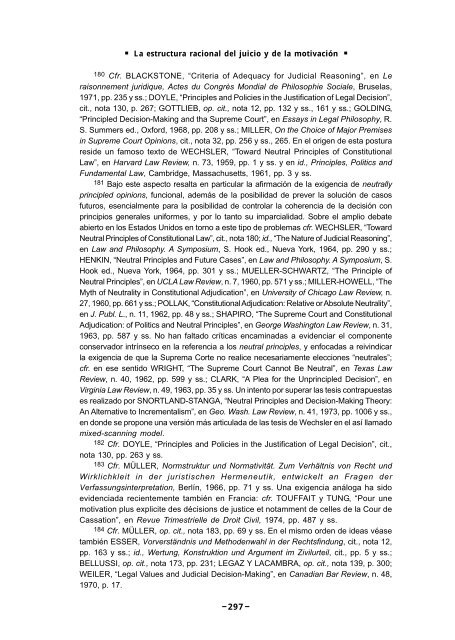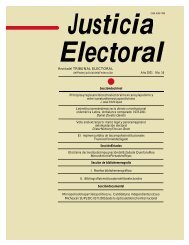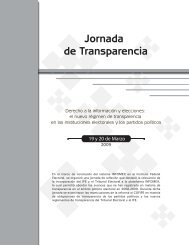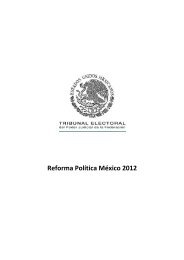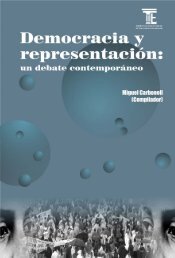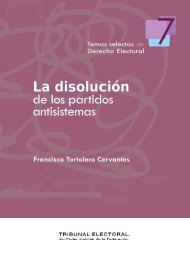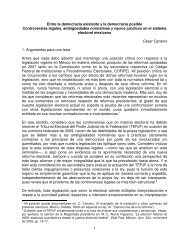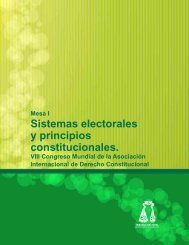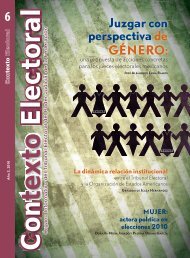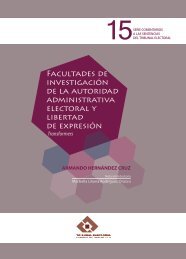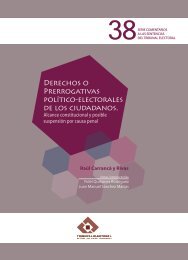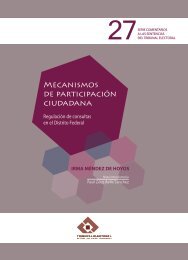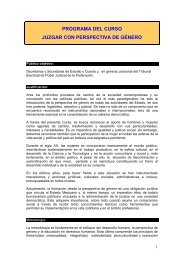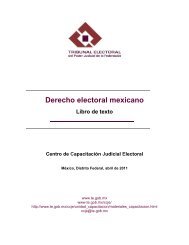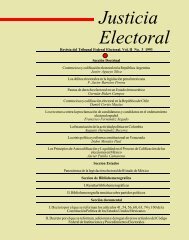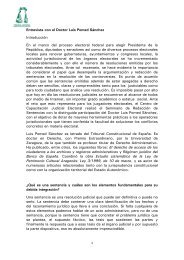La Motivación de la Sentencia Civil - Tribunal Electoral del Poder ...
La Motivación de la Sentencia Civil - Tribunal Electoral del Poder ...
La Motivación de la Sentencia Civil - Tribunal Electoral del Poder ...
Create successful ePaper yourself
Turn your PDF publications into a flip-book with our unique Google optimized e-Paper software.
<strong>La</strong> estructura racional <strong>de</strong>l juicio y <strong>de</strong> <strong>la</strong> motivación<br />
180 Cfr. BLACKSTONE, “Criteria of A<strong>de</strong>quacy for Judicial Reasoning”, en Le<br />
raisonnement juridique, Actes du Congrès Mondial <strong>de</strong> Philosophie Sociale, Bruse<strong>la</strong>s,<br />
1971, pp. 235 y ss.; DOYLE, “Principles and Policies in the Justification of Legal Decision”,<br />
cit., nota 130, p. 267; GOTTLIEB, op. cit., nota 12, pp. 132 y ss., 161 y ss.; GOLDING,<br />
“Principled Decision-Making and tha Supreme Court”, en Essays in Legal Philosophy, R.<br />
S. Summers ed., Oxford, 1968, pp. 208 y ss.; MILLER, On the Choice of Major Premises<br />
in Supreme Court Opinions, cit., nota 32, pp. 256 y ss., 265. En el origen <strong>de</strong> esta postura<br />
resi<strong>de</strong> un famoso texto <strong>de</strong> WECHSLER, “Toward Neutral Principles of Constitutional<br />
<strong>La</strong>w”, en Harvard <strong>La</strong>w Review, n. 73, 1959, pp. 1 y ss. y en id., Principles, Politics and<br />
Fundamental <strong>La</strong>w, Cambridge, Massachusetts, 1961, pp. 3 y ss.<br />
181 Bajo este aspecto resalta en particu<strong>la</strong>r <strong>la</strong> afirmación <strong>de</strong> <strong>la</strong> exigencia <strong>de</strong> neutrally<br />
principled opinions, funcional, a<strong>de</strong>más <strong>de</strong> <strong>la</strong> posibilidad <strong>de</strong> prever <strong>la</strong> solución <strong>de</strong> casos<br />
futuros, esencialmente para <strong>la</strong> posibilidad <strong>de</strong> contro<strong>la</strong>r <strong>la</strong> coherencia <strong>de</strong> <strong>la</strong> <strong>de</strong>cisión con<br />
principios generales uniformes, y por lo tanto su imparcialidad. Sobre el amplio <strong>de</strong>bate<br />
abierto en los Estados Unidos en torno a este tipo <strong>de</strong> problemas cfr. WECHSLER, “Toward<br />
Neutral Principles of Constitutional <strong>La</strong>w”, cit., nota 180; id., “The Nature of Judicial Reasoning”,<br />
en <strong>La</strong>w and Philosophy. A Symposium, S. Hook ed., Nueva York, 1964, pp. 290 y ss.;<br />
HENKIN, “Neutral Principles and Future Cases”, en <strong>La</strong>w and Philosophy. A Symposium, S.<br />
Hook ed., Nueva York, 1964, pp. 301 y ss.; MUELLER-SCHWARTZ, “The Principle of<br />
Neutral Principles”, en UCLA <strong>La</strong>w Review, n. 7, 1960, pp. 571 y ss.; MILLER-HOWELL, “The<br />
Myth of Neutrality in Constitutional Adjudication”, en University of Chicago <strong>La</strong>w Review, n.<br />
27, 1960, pp. 661 y ss.; POLLAK, “Constitutional Adjudication: Re<strong>la</strong>tive or Absolute Neutrality”,<br />
en J. Publ. L., n. 11, 1962, pp. 48 y ss.; SHAPIRO, “The Supreme Court and Constitutional<br />
Adjudication: of Politics and Neutral Principles”, en George Washington <strong>La</strong>w Review, n. 31,<br />
1963, pp. 587 y ss. No han faltado críticas encaminadas a evi<strong>de</strong>nciar el componente<br />
conservador intrínseco en <strong>la</strong> referencia a los neutral principles, y enfocadas a reivindicar<br />
<strong>la</strong> exigencia <strong>de</strong> que <strong>la</strong> Suprema Corte no realice necesariamente elecciones “neutrales”;<br />
cfr. en ese sentido WRIGHT, “The Supreme Court Cannot Be Neutral”, en Texas <strong>La</strong>w<br />
Review, n. 40, 1962, pp. 599 y ss.; CLARK, “A Plea for the Unprincipled Decision”, en<br />
Virginia <strong>La</strong>w Review, n. 49, 1963, pp. 35 y ss. Un intento por superar <strong>la</strong>s tesis contrapuestas<br />
es realizado por SNORTLAND-STANGA, “Neutral Principles and Decision-Making Theory:<br />
An Alternative to Incrementalism”, en Geo. Wash. <strong>La</strong>w Review, n. 41, 1973, pp. 1006 y ss.,<br />
en don<strong>de</strong> se propone una versión más articu<strong>la</strong>da <strong>de</strong> <strong>la</strong>s tesis <strong>de</strong> Wechsler en el así l<strong>la</strong>mado<br />
mixed-scanning mo<strong>de</strong>l.<br />
182 Cfr. DOYLE, “Principles and Policies in the Justification of Legal Decision”, cit.,<br />
nota 130, pp. 263 y ss.<br />
183 Cfr. MÜLLER, Normstruktur und Normativität. Zum Verhältnis von Recht und<br />
Wirklichkleit in <strong>de</strong>r juristischen Hermeneutik, entwickelt an Fragen <strong>de</strong>r<br />
Verfassungsinterpretation, Berlín, 1966, pp. 71 y ss. Una exigencia análoga ha sido<br />
evi<strong>de</strong>nciada recientemente también en Francia: cfr. TOUFFAIT y TUNG, “Pour une<br />
motivation plus explicite <strong>de</strong>s décisions <strong>de</strong> justice et notamment <strong>de</strong> celles <strong>de</strong> <strong>la</strong> Cour <strong>de</strong><br />
Cassation”, en Revue Trimestrielle <strong>de</strong> Droit <strong>Civil</strong>, 1974, pp. 487 y ss.<br />
184 Cfr. MÜLLER, op. cit., nota 183, pp. 69 y ss. En el mismo or<strong>de</strong>n <strong>de</strong> i<strong>de</strong>as véase<br />
también ESSER, Vorverständnis und Metho<strong>de</strong>nwahl in <strong>de</strong>r Rechtsfindung, cit., nota 12,<br />
pp. 163 y ss.; id., Wertung, Konstruktion und Argument im Zivilurteil, cit., pp. 5 y ss.;<br />
BELLUSSI, op. cit., nota 173, pp. 231; LEGAZ Y LACAMBRA, op. cit., nota 139, p. 300;<br />
WEILER, “Legal Values and Judicial Decision-Making”, en Canadian Bar Review, n. 48,<br />
1970, p. 17.<br />
297


